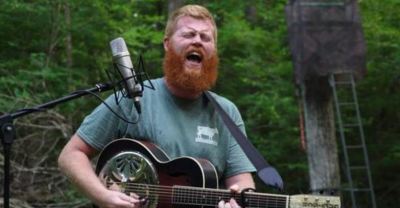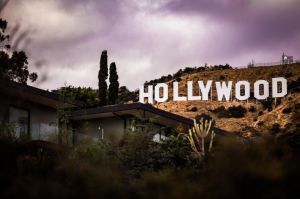Resenting rich men north of Richmond

Tom Holland in Dominion: How the Christian Revolution Remade the World notes that Christianized societies, even if ostensibly “post-Christian,” valorize victimhood in ways unimaginable to ancient pagan societies that only esteemed strength. Victimhood is now de rigueur for nearly all groups, even “elites.” The new popular victimhood anthem for rural blue-collar men is “Rich Men North of Richmond,” in which an Appalachian singer inveighs against the corruptions of the ruling class:
“Well, God, if you’re 5-foot-3 and you’re 300 pounds / Taxes ought not to pay for your bags of fudge rounds / Young men are puttin’ themselves six feet in the ground / ‘Cause all this damn country does is keep on kickin’ them down.”
Such protest songs are a rich legacy of American culture. They include Pete Seegar, Peter, Paul & Mary, and Joan Baez, who were on the political left and shared similar complaints about exploitative rich elites.
Arguably one of the earliest grievance anthems is the Virgin Mary’s Magnificat in which she declares:
“He has shown strength with his arm; he has scattered the proud in the thoughts of their hearts; he has brought down the mighty from their thrones and exalted those of humble estate; he has filled the hungry with good things, and the rich he has sent away empty.”
Of course, Mary’s grievance anthem points to God’s ongoing redemption. Confidence in divine redemption is less apparent in more recent grievance motifs. But the singer of “Rich Men North of Richmond” did in a recent performance preface his song with Psalm 37:
“The wicked plot against the righteous and gnash their teeth at them. But the Lord laughs at the wicked for he knows their day is coming. The wicked draw the sword and bend the bow to bring down the poor and needy, to slay those whose ways are upright.”
Of course, this scriptural preface begs the question: Who are the wicked, and who are the righteous? Who are these unnamed rich men north of Richmond, and who are their victims?
Victimology by region and class is as old as America. Jeffersonians resented the stockjobbers and speculators of northeastern cities, demonizing urbanites while romanticizing agrarian life, ignoring its reliance on slavery, whose evils far exceeded early Wall Street. Later Jacksonians rallied the backcountry against the financiers, embodied in the Philadelphia-based Bank of the United States. The pre-Civil War South resented the industrial North for denouncing slavery while profiting from it. Post-Civil War populists bewailed the plutocrats of the Industrial Revolution, especially the railroads. William Jennings Bryan rallied the South, prairie, and West against the tight money of the gold standard preferred by the Northeast. The isolationist Midwest opposed help for the Allies in WWI and WWII, claiming eastern banks and investors were war profiteers.
The 1960s were aflame with protests and grievance politics by blacks, feminists, youthful hippies, and peaceniks, followed by a backlash from “middle America,” wanting stability and law and order. Embodying the old middle America in the 1970s was Archie Bunker, the New York blue-collar middle-aged man spoofed by Norman Lear’s “All in the Family,” whose opening song pining for earlier times was “Those Were the Days:”
“Boy, the way Glenn Miller played
songs that made the hit parade
Guys like me we had it made
Those were the days
Didn’t need no welfare state
ev’rybody pulled his weight
gee our old LaSalle ran great
Those were the days
And you knew who you were then
girls were girls and men were men
Mister we could use a man like Herbert Hoover again
People seemed to be content
fifty dollars paid the rent
freaks were in a circus tent
Those were the days
Take a little Sunday spin
go to watch the Dodgers win
Have yourself a dandy day
that cost you under a fin
Hair was short and skirts were long
Kate Smith really sold a song
I don’t know just what went wrong
those were the days.”
Archie Bunker represented a now almost nonexistent demographic, blue-collar urban whites, who were typically ethnics, Italians, Greeks, Poles, who for several generations had lived in their old neighborhoods, centered around family and church, and were aghast over postwar social trends that began to displace them into the suburbs. Bunker was interestingly a white Anglo Protestant, who didn’t attend or like his church very much, mocking and typically mispronouncing the name of his pastor Reverend Felcher, as “Reverend Fletcher.”
Long after Archie Bunker had left the scene, grievance politics were amplified in 2020 with Black Lives Matter protests, which strove to articulate the anguish of many blacks contending against the legacy of centuries of slavery, segregation, and discrimination. But unlike the earlier Civil Rights Movement, which emerged from the black church, BLM did not embrace American Exceptionalism and offered no redemption, only condemnation. Its fruits were mainly the retreat of urban law enforcement followed by increased crime, of which urban blacks were the chief victims. Professions of chronic victimhood, even if justified, are often self-defeating.
Civil Rights protests in the 1950s and 1960s rejected chronic victimhood and appealed to the American Creed that rhetorically sought one nation fair to all. Modern identity politics mostly rejects national harmony in favor of preferred interest groups centered on race, ethnicity, sexuality, or economic status. They inveigh against a perceived oppressor or abstract system with vast control, privileging itself and tormenting everybody else.
Modern identity politics pit innocent victims against their supposed perpetual tormentors. It’s usually unclear how these tormentors will be defeated. Instead, they are just continuously denounced as part of the grievance, almost making grievance itself the goal and central to the identity.
In few societies are there ever completely innocent victims or all-powerful tormentors. Mostly there are contending interest groups pursuing what they perceive to be best for them and clashing with other interest groups. Ideally, these competing interests are mediated peacefully and not deemed existential or apocalyptic.
The fallen human condition is such that every person and every group has misguided and often selfish views of what is best. Justice must be sought but with the realism that absolute earthly justice is not possible, and with the awareness that nobody is completely just.
Pitting the supposed righteous in society against the wicked is politically futile and destructive. Instead, interests must be negotiated among competing factions, which are themselves in continuous flux. Many “rich men north of Richmond” are from south or west of Richmond, from modest backgrounds, but who moved. And once great “rich men” are now forgotten, their descendants disappear into the national fabric.
America’s chief founding father, George Washington, was himself literally a “rich man north of Richmond” who like the other founders had no illusions about human nature, noting:
“A small knowledge of human nature will convince us, that, with far the greatest part of mankind, interest is the governing principle … Few men are capable of making a continual sacrifice of all views of private interest, or advantage, to the common good.”
And more pithily: “We must take human nature as we find it, perfection falls not to the share of mortals.”
At least somewhat aware of this conundrum, the recent song complains: “Livin’ in the new world / With an old soul / These rich men north of Richmond / Lord knows they all just wanna have total control.” True, for the current “rich men” and for all others who would replace them, as replaced they will be at some point. Few willingly relinquish power, but power inevitably recedes.
As the Virgin Mary promised about a divine process that never ends: “He has brought down the mighty from their thrones and exalted those of humble estate.”
Originally published at Juicy Ecumenism.
Mark Tooley became president of the Institute on Religion and Democracy (IRD) in 2009. He joined IRD in 1994 to found its United Methodist committee (UMAction). He is also editor of IRD’s foreign policy and national security journal, Providence.




























